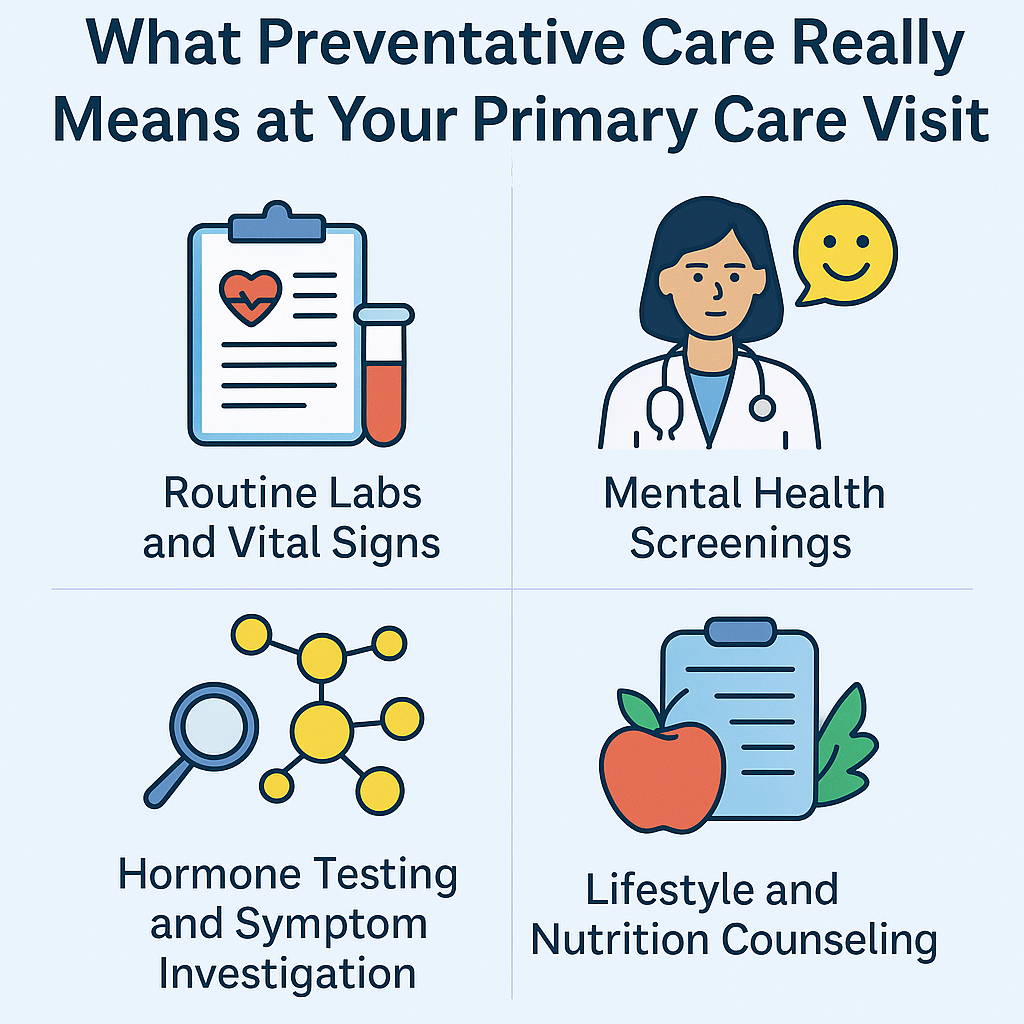When most people think of a preventative care visit, they imagine a few standard things: a physical exam, maybe some lab work, a blood pressure check, and a reminder to cut back on sugar. But if that’s all your primary care provider offers, you’re missing out on the full picture. Today, preventative care can look a lot more holistic, more personalized, and, ultimately, more life-changing.
That’s because the best preventative care helps uncover early signs of chronic illness, identifies subtle mental health challenges, addresses hormonal shifts before they become disruptive, and builds a roadmap to long-term well-being.
If you’ve been searching for the best primary care doctors near you, it’s worth understanding what modern preventative care should include and how the right provider can change everything.
Why Preventative Care Still Matters (Even If You Feel Fine)
Preventative care is built on one simple idea: catch things early. According to the CDC, six in ten Americans have at least one chronic disease, and four in ten live with two or more. Most of those conditions, such as high blood pressure, diabetes, and heart disease, start quietly. Preventative care exists to detect them before they escalate.
Preventative care is about building resilience. It supports your mental health, hormone stability, cardiovascular strength, and even your future mobility. Done right, it helps you stay ahead of the curve rather than catching up after something goes wrong.
The Centers for Medicare & Medicaid Services defines preventative care as services that “block or delay the development of illness and disease” through early screenings, lifestyle guidance, and coordination with behavioral health. That’s a far cry from the quick, transactional check-ins many of us grew up with.
What Happens at a Comprehensive Preventative Visit
At a quality primary care clinic, a preventative visit will cover far more than basic tests. Here’s what a more integrative approach should include:
Routine Labs and Vital Signs
These are still important. Blood sugar, cholesterol, blood pressure, and body mass index offer a snapshot of your current physical health. When tracked over time, they can signal trends before they become problems.
Mental Health Screenings
One of the most overlooked parts of preventative care is psychological health. However, this is changing fast. The U.S. Preventive Services Task Force now recommends routine anxiety screenings for all adults under 64, including postpartum patients. Depression screenings are also standard, including for older adults.
Mental health symptoms often go unreported or misunderstood. Fatigue, trouble concentrating, and poor sleep can stem from anxiety, burnout, or even hormone imbalances. Screening creates a safe space to open up and explore what’s beneath the surface.
Hormone Testing and Symptom Investigation
You don’t need to be menopausal or bodybuilding to talk about hormones. Subtle hormonal imbalances can impact energy, mood, metabolism, sleep, and libido even in your 20s or 30s.
While not all clinics offer this during a routine visit, the best primary care doctors near you should include early hormone testing as part of their preventative model, especially when symptoms suggest a deeper cause.
Testosterone, thyroid hormones, insulin, and cortisol levels can all play a role in how you feel day-to-day. Catching an imbalance early can prevent years of unexplained fatigue or mood swings.
Cognitive and Neurological Checks
As part of aging well, preventative care may also include memory checks, fall risk evaluations, or cognitive assessments. These are especially important for adults over 60 but can also help younger patients experiencing brain fog, forgetfulness, or focus issues.
Lifestyle and Nutrition Counseling
Another key difference in high-quality preventative care: the doctor talks with you, not just about you. Expect real conversations about diet, exercise, alcohol use, sleep quality, and stress. And more importantly, expect judgment-free, actionable advice.
CMS guidelines now recognize counseling and lifestyle guidance as core parts of preventative care. That includes everything from help quitting smoking to personalized advice on meal planning or fitness routines that match your goals.
The Impact of Early Detection
When done right, preventative care can catch things you’d never expect. For example:
- Diabetes screening for adults aged 40 to 70 who are overweight or obese is now standard. A simple A1C test can uncover prediabetes long before symptoms appear.
- Cholesterol screening can flag heart disease risks even in people with no family history.
- Colorectal cancer screening, now recommended starting at age 45, helps detect cancer early when treatment outcomes are best.
- BRCA genetic screening is advised for certain women with a family history of breast or ovarian cancer, long before a lump or symptom develops.
And remember: Many screenings are fully covered by insurance when coded as preventative. That includes mammograms, Pap smears, HIV testing, and immunizations like flu or HPV vaccines.
Preventative Care vs. Diagnostic
Patients often feel confused or frustrated when billed differently for what seems like the same visit. The reason often comes down to coding.
Preventative care is performed when you’re symptom-free and just want to stay healthy. Diagnostic care is what happens when you visit the doctor with a complaint or symptom, like fatigue, headaches, or joint pain. A cholesterol panel during a wellness exam is preventative. The same panel ordered because of dizziness is diagnostic and billed differently.
Knowing this helps you communicate clearly with your provider and prepare for potential costs. It also reinforces why proactive, scheduled checkups are so valuable: They catch problems early, under the umbrella of coverage.
What to Expect From the Best Primary Care Doctors Near You
If you’ve recently searched for preventative care near you and landed here, chances are you’re ready for something better than rushed appointments and prescription refills.
At Zeam Health & Wellness, our primary care services go beyond the basics. We provide comprehensive preventative care that includes mental health evaluations, early hormone assessments, and long-term chronic condition support, all under one roof.
Our primary care locations in Folsom and Roseville are staffed by providers who treat you like a partner, not a problem to solve. Whether you’re seeking a fresh start or just need a provider who truly listens, we’re here to support your health journey.
If you’ve been looking for the best primary care doctors near you, we’d be honored to be your care team. Contact us today to schedule a visit and experience what integrative preventative care really feels like.




